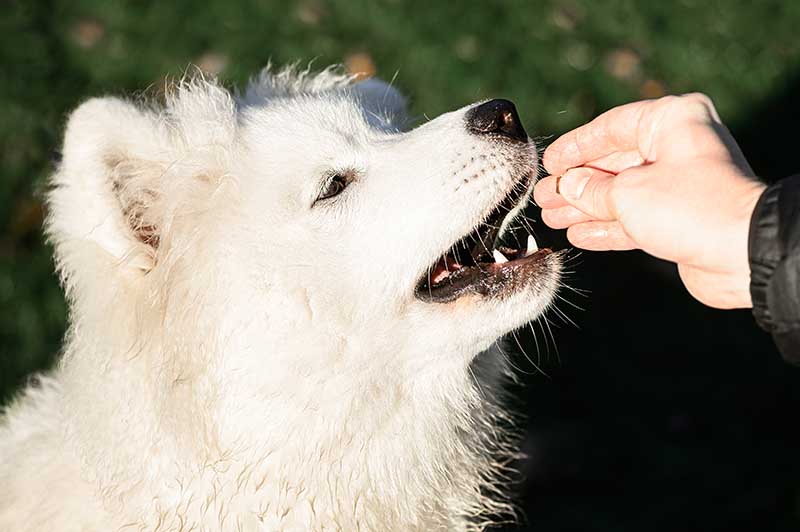Do Samoyeds Bark a Lot? Tips, Facts & FAQ

Updated on

Click to Skip Ahead
Barking and dogs go paw in paw, and some breeds are more prone to making noise than others. Most Samoyeds bark excessively, though some are relatively quiet. It depends on several factors, including how bored they are or how much they were socialized as a puppy.
You’ll never completely remove your Samoyed’s urge to bark, and you should never forcefully try to make them be quiet. Instead, figure out why they’re barking. From there, you can work out how to manage the behavior with positive reinforcement. This guide will contain tips on why your Samoyed barks and how to train them to control their noisiness.
Do Samoyeds Bark Excessively?
Samoyed are known to be barkers, though like any dog breed, some bark more than others. They will also howl, but they don’t do that as much as breeds like the Siberian Husky. How much your Samoyed barks depends on their personality, genetics, and triggers. Their level of training and if they’ve learned that the behavior earns them your attention makes a difference too.
Whether your Samoyed barks excessively or not, though, their voice is easily recognizable and quite loud. Unfortunately, this means many people find a Samoyed’s bark to be grating and annoying. Even if your Samoyed doesn’t bark much, your neighbors might detest any noise that they make just as much as they would if your dog barked all the time.

Why Do Samoyeds Bark?
It might be difficult to determine why your Samoyed is barking, but there will always be a reason for the behavior. Before you start taking steps to manage your Samoyed’s barking, you’ll need to know what their trigger is,1 so you can tackle the underlying cause.
Anxiety
A common cause for unwanted behavior in dogs is anxiety or fear. If you’ve left your Samoyed on their own for too long, they might be suffering from separation anxiety. They could also be nervous or stressed by a situation. In both cases, barking is a way to alleviate frustration and often appears with other behaviors, such as destructiveness and inappropriate urination.
Boredom
Samoyeds were bred to be working animals. They hunted reindeer alongside the Samoyedic people and then went on to work as herders and guardian animals.2 These jobs required dedication and plenty of energy, which today’s Samoyeds retain.
Their energy and intelligence give them a strong desire to always have a job to do. Without something to keep them busy, they get bored quickly and often become destructive. Barking and howling are ways for your Samoyed to show their displeasure and release pent-up frustration.
Communication
Samoyeds are pack animals and need a way to communicate with their packmates, both human and canine. They’ll bark and howl to talk to their companions, especially when they’re out of sight during a hunt or protecting a herd of reindeer and need to get your attention or scare off a predator.
It’s also how they’ll request your attention. They’ll bark when they greet you at the door or when they’re trying to remind you that it’s dinner time.

Health Issues
Your Samoyed will bark if they’re in pain or feeling sick. Sometimes, Samoyeds will try to hide when they’re suffering, but they will also let you know that something is wrong by vocalizing their distress.
Sick dogs will also show other signs, like loss of appetite or whining when you touch them. Go to your veterinarian if you suspect that your Samoyed is barking due to a health issue.
Learned Behavior
A common reason for unwanted behavior in dogs is that it is learned. Samoyeds are intelligent and excellent problem solvers. If they want something, like a treat, and aren’t taught the proper way of behaving, they’ll find the best way of achieving their goal on their own. Sometimes, we’re international supporters of their bad habits.
Be careful when you give attention to your Samoyed when they’re barking, whether you’re petting them to soothe them or loudly shushing them. They’ll learn from your response that it’s a surefire way of getting you to notice them.
Territory
Samoyeds aren’t among the most territorial dogs, but they do have a protective streak. After all, part of their original job was protecting their owners and herds of reindeer. Feeling the need to bark to protect their territory can also be a result of anxiety or fear. If your Samoyed is unsure of a situation, they’ll bark to alert you or to warn off the potential threat.

How to Stop Excessive Barking
There’s no way to completely stop your Samoyed from barking because it’s an instinctive behavior that they use to communicate. However, you can manage the behavior so it’s less of a nuisance to you and your neighbors.
Once you know what causes excessive barking from your dog, here are a few tips to reduce the amount that they bark. You’ll need time, patience, and dedication for success.
Exercise
Boredom is one of the most common reasons for excessive barking, so keeping your Samoyed active is a good way to manage the issue. Regular walks and visits to the dog park will encourage your canine to interact with and explore the world around them. It’ll keep their minds active and enable them to stretch their legs and get fresh air.
The more focused they are on investigating new smells, the less likely they are to bark. That said, you might get a few happy yips while they’re playing.

Pet Sitter or Lunch Break Visit
The Samoyed relies heavily on companionship; even their ancestors had a strong bond with humans. They are an incredibly friendly breed but don’t do well when left on their own. Due to this trait, loneliness is a common cause of excessive barking when you’re not at home.
Don’t leave your Samoyed alone for too long. If you work nearby, consider going home for lunch. You can also hire a pet sitter or ask a friend to stop in to say “hi” to your Samoyed while you’re at work. Another pet can take away a bit of your Samoyed’s loneliness, but they will still need to spend plenty of time with you.
Obedience Training
All dogs need training. The Samoyed is intelligent and will figure things out on their own when given the chance. Proper obedience training will help prevent your Samoyed from developing unwanted behavior and help control their noisier tendencies.
Teach them the “quiet” command so you can give them a verbal cue when you want them to stop barking. You can also pair this with the “speak” command so your Samoyed can still enjoy a good bark now and then.

Positive Reinforcement
Samoyeds can be stubborn but they’re also eager to please. They love to make their owner happy, and the best way of showing this is by praising them with their favorite treat. Positive reinforcement will keep training sessions fun and rewarding for your dog. It’ll also help encourage them to continue following your instructions.
For the best results, reward your Samoyed with a treat whenever they stop barking after you give the “quiet” command. You’ll need to be quick to start with, but gradually, your dog will learn that silence gets them a tasty reward.
Socialization
Anxiety or fear about a new situation is one of the biggest reasons that dogs bark. The Samoyed is a naturally friendly breed, but they can be timid around strangers if you don’t introduce them to various people and situations when they’re growing up.
Socializing your Samoyed will help boost their confidence. They’ll face new people and situations with courage and be less likely to feel anxious. This will also reduce the amount that they bark.
Be aware that you can socialize older dogs, not just puppies. Progress will be slow, but you can indeed teach an older Samoyed to adore meeting new people.
Final Thoughts
The Samoyed might not be one of the noisiest dog breeds around, but many of these dogs do bark excessively. The noise that they make can be frustrating to you and your neighbors. Fortunately, it can be controlled through training. Just be aware that you’ll need patience, positivity, and consistency to figure out why your Samoyed is barking and how to manage it.
- See Also: Are Samoyeds Good With Cats? Facts & FAQ
Featured Image Credit: MVolodymyr, Shutterstock













